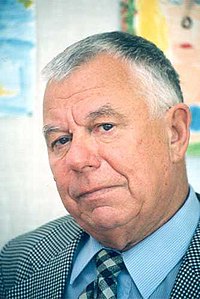Anatoly Pristavkin

Anatoly Ignatovich Pristavkin (Russian: Анато́лий Игна́тьевич Приста́вкин, 17 October 1931, Lyubertsy — 11 July 2008, Moscow) was a Russian writer and public figure.[1][2]
His mother died when he was nine and his father died in
Pristavkin took part in the Soviet opposition movement. In 1988, he joined the writers association Aprel, a pro-Perestroika organization of Russian writers. On 4 November 1989 he took part in the Alexanderplatz demonstration in East Berlin against the regime in East Germany. In 1991 he supported the Latvian independence movement, stood at barricades in Riga and appealed to Soviet soldiers via regional television, urging them not to shoot at civilians. In 1995 and 1996 he visited Chechnya and encountered assaults on civilian population. He later criticised Russia's Chechnya policies in the media.
In the 1990s, Pristavkin headed the Pardon Commission of the Russian Federation.[5] In 1993, he signed the Letter of Forty-Two in support of Boris Yeltsin in his stand against the Russian parliament.[6]
References
- ^ Douglas Martin, « Anatoly I. Pristavkin, 76, Russian Writer, Is Dead », JULY 20, 2008 nytimes.com
- ^ « Anatoli Pristavkin: Russian writer », July 30 2008, The Times
- ^ Анастасия Суворова, « Последний роман Анатолия Приставкина », July 11 2018, Trud
- ISBN 9781134260775.
- theguardian.com
- ^ Писатели требуют от правительства решительных действий. Izvestia (in Russian). 5 October 1993. Archived from the original on 16 July 2011. Retrieved 21 August 2011.
